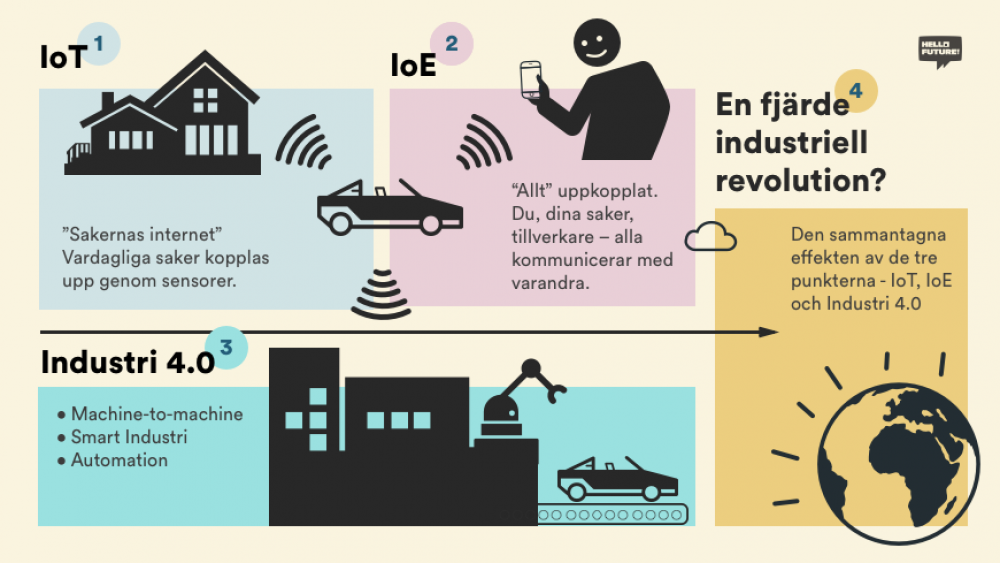Industri 4.0 är glödhett – och Sverige är patenthetast i Europa
https://computersweden.idg.se/2.2683/1.719431/sverige-industri-40

Why is Industry 4.0 Important in Manufacturing?
There are several key reasons why Industry 4.0 technologies will increasingly be adopted by manufacturers:
Cost Efficiency: Machine Monitoring solutions, predictive maintenance strategies, and other advanced operational technology will help manufacturers decrease downtime, increase throughput, and overall, reduce the cost of supplying quality parts.
Democratizing Data: Along with many other industries, manufacturing has suffered from siloed data, not only among separate departments within the organization, but also at different levels (ie. the machine level, the plant level, corporate). A connected operation provides accessibility to disparate data sources, and if done properly, provides an easy way to use that data for effective decision-making.
Operational Agility: Being able to quickly react to fluctuating demand, new product trends, the skills gap, and other unpredictable challenges is key for any manufacturer. With the right technology in place, manufacturers have a greater likelihood to successfully pivot when experiencing adversity.
Documentation and Traceability: With digitized information, a nearly limitless amount of manufacturing data can be stored via the cloud. What this means is that all manually collected information can be converted to a digitized data collection system, which can be used for anything from training new workers with legacy knowledge, to building advanced algorithms with historical data. The options are unlimited as long as the data is stored and accessible in such a way to build solutions.
Retaining Customers: Power among suppliers and consumers has continued to trend towards the customer, with increasing expectations around service and product quality. To meet these rising demands, manufacturers will be forced to adopt technology to support customization, product development, after-sale service, and more.
Industri 4.0
Produktionen blir intelligent och automatiserad
Omfattar även: machine to machine (M2M), smart industri, automation.
Industri 4.0 är den allomfattande termen för effekten som den teknologiska utvecklingen får för er som aktörer inom industrin. Samma utveckling inom processorer, AI och sensorer som möjliggör uppkopplade, smarta konsumentprodukter, möjliggör en ny typ av maskinpark. En automatiserad, intelligent sådan där maskinerna kommunicerar med varandra och med operatörerna och då tillåts agera mycket mer effektivt och flexibelt.
Sintercast har ett par kraftfulla verktyg för att nå upp till denna nya standard.
Tupy kom redan 2019
“SinterCast Cast Tracker-teknologin är ett viktigt steg i vårt åtagande att etablera Tupy som det ledande järngjuteriet inom processtyrning, innovation och spårbarhet enligt Industri 4.0.
Hyundai skall inte vara sämre
https://storage.mfn.se/2c887fa7-d7d3-482b-bf1a-3631471421a7/press-release-pdf-english-version.pdf
“Our Ladle Tracker technology enables the foundry to measure and control every
step of the process on the liquid metal side of the foundry, bringing Industry 4.0 traceability and connectivity to the foundry managers and reassurance to the foundry customers. We look forward to continuing to develop and grow our unique suite of Tracking Technologies.”
Jag menar att Sintercast har inte varit tillräckligt tydliga vad denna nya standard kommer att betyda i framtiden. Ett införande av denna standard inom gråjärns och segjärnsgjuterierna innebär ett karftigt utökat kundunderlag.
Marknaden för CGI är i nuläget ca 175.000 ton ( 3,5 milj ekv )
Markanden för gråjärn är ca 50.000.000 ton
och för segjärn är den 25.000.000 ton
De marknaderna är alltså över 400 ggr så stora som CGI-marknaden ( siffror från 2015 )